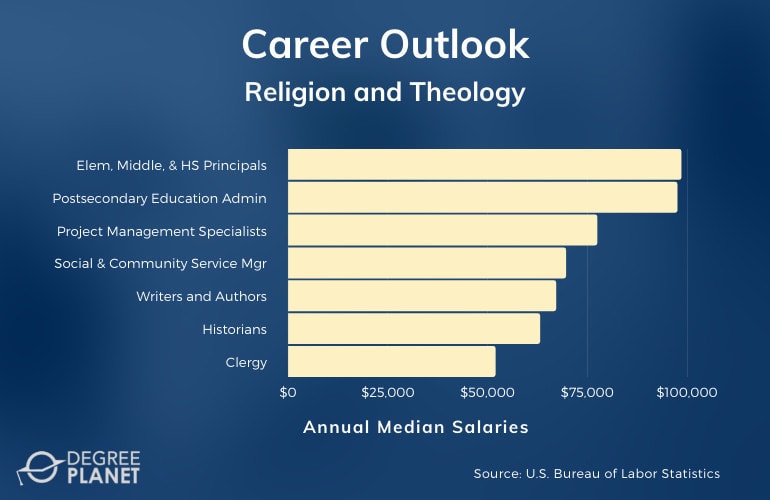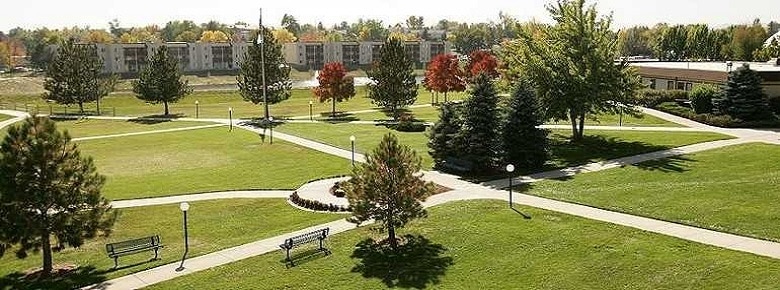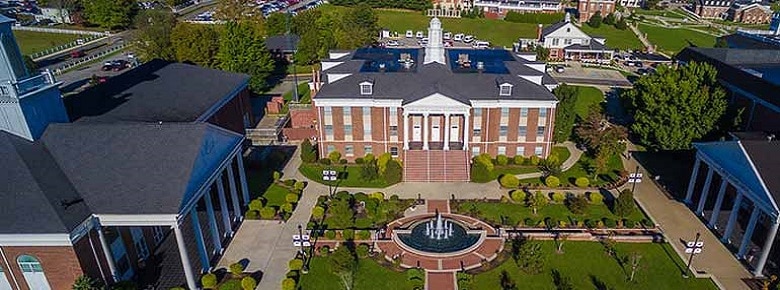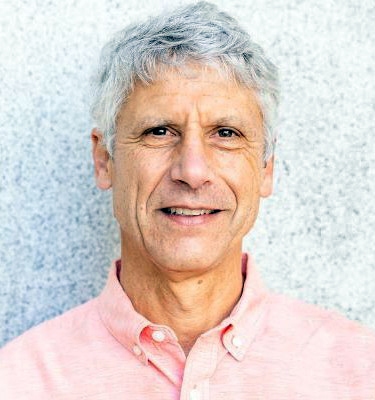Earning a masters in religious studies online can allow you to both explore faith and spirituality and enjoy interdisciplinary approaches to the study of the Bible.

This type of program can also touch on contemporary topics in culture, ethics, and leadership.
Editorial Listing ShortCode:
There are many reasons why you may want to pursue a religious studies graduate degree. It might help you prepare for ordination down the road, develop an academic career path, or expand your leadership competencies and horizons.
Online Masters in Religious Studies Programs

Religious studies graduate programs can help you develop critical insights into universal features of the human spirit and condition in contexts enriched by challenging inquiry. Some programs have a stronger focus on Christian education, while others have more of a dynamic interdisciplinary and liberal arts approach.
Editorial Listing ShortCode:
As you compare different types of curriculum designs, you’ll see the variety of topics, questions, and perspectives you can encounter in this kind of major, such as:
- Comparative religion and theology
- Human psychology and spirituality
- Counseling and healing arts
- Spiritual formation and leadership development
- Pastoral training
- Academic research
Religious studies programs are often designed with dynamic, interdisciplinary pathways that can help you pursue more individualized areas of inquiry, reflection, and research.
Common Master in Religious Studies Specializations

Religious studies grad programs can offer a variety of specializations and approaches. Here are some common religious studies concentrations:
- Comparative Religion. This specialization consists of a more liberal arts framework and covers the core tenets and historical features of major world religions.
- Christian Ministry. Professionals interested in practical and biblically informed teaching and leadership skills may want to pursue a Christian ministry concentration. This kind of track typically emphasizes pastoral care, homiletics, Christian counseling, Christian outreach, and Christian formation.
- Biblical Studies. In this specialization, you typically learn more advanced knowledge related to biblical languages and engage in methodic study of the Old Testament and New Testament.
- Spirituality and Healing. This track is an eclectic approach to the exploration of spirituality, religion, spiritual development, and therapeutic skills related to self-care, marriage and family counseling, grief counseling, behavioral therapies, or even life coaching.
- Interreligious Studies. This track typically examines major world religions and emphasizes the principles of interfaith dialogue, including courses designed to develop research, policy analysis, advocacy, and organizational leadership skills.
Religious studies offers many interdisciplinary pathways. As you compare curriculum designs, it can help to think about what kinds of career competencies and professional networks you want to develop.
Religion and Theology Careers & Salaries

A religious studies graduate program can help you shape a meaningful and rewarding career path. According to the Bureau of Labor Statistics, some of the following careers may require specialized training and licensing, but they can typically offer meaningful work and above average salaries.
| Careers | Annual Median Salaries |
| Elementary, Middle, and High School Principals | $98,490 |
| Postsecondary Education Administrators | $97,500 |
| Project Management Specialists | $77,420 |
| Social and Community Services Managers | $69,600 |
| Writers and Authors | $67,120 |
| Historians | $63,100 |
| Clergy | $51,940 |
| Marriage and Family Therapists | $51,340 |
| Substance Abuse, Behavioral Disorder, and Mental Health Counselors | $47,660 |
| Religious Activities and Education Directors | $45,110 |
Professionals with mature spiritual, ethical, and critical thinking gifts can make valuable contributions in many kinds of high-impact career roles. Many professionals with a religious education leverage their passion for social justice and their cultural and interpersonal perspectives to be collaborators or leaders in various fields.
Editorial Listing ShortCode:
For instance, they may work in healthcare, public administration, social work, counseling, education, nonprofit leadership, or public policy. Others pursue ordination or leadership positions in a religious organization.
MA in Religious Studies Curriculum & Courses

Depending on a college’s public or denominational status, you may find many curriculum designs. Some are focused on Christian pastoral training, and others have more eclectic liberal arts orientations. Here are examples of some courses you may come across:
- Overview of Comparative Religions: This course provides a rich introduction to the world’s major faith traditions in a framework that highlights principal features of religious doctrine and their impacts on society, culture, and spiritual formation.
- An Introduction to Christian Theology: This course explores the Christian worldview and the broad contours of seminal biblical narratives and their related theological concepts.
- Prophetic Traditions: You’ll learn about the role of prophets and prophecy in the origins and development of religious belief, and you’ll explore questions related to prophecy, divine laws, and ethics.
- Modern Religion and Secular Culture: Through the lenses of current events, theological and sociological research, and even modern fiction, this course examines the ways religious culture and secular culture can mutually inform each other or lead to conflict.
- Leadership and Spirituality: This course highlights religious leadership concepts and explores ethical and humanistic features of spiritually informed approaches to leadership and social change.
- Faith and Pluralism: This course looks at the historical movements that gave rise to the world’s most prominent faith traditions, and it explores topics related to religious tolerance and models related to interfaith dialogue and cooperation.
- New Testament Theology: This class focuses on key features of New Testament scripture and theology, and it looks at key areas of contrast between Old Testament law and New Testament theology.
- Contemporary Spirituality and Evangelism: You’ll explore topics related to religious teaching, preaching, outreach, formation, and communication in contemporary contexts and cultural settings.
- Pastoral Care: You’ll learn frameworks, concepts, and methods for translating religious faith and spiritual insights into practical and meaningful forms of healing and caring ministries.
- Research Methods in Theology: This course provides aspiring pastors and theologians with a solid foundation in relevant research tools, resources, and methods.
Hopefully this list gives you an idea of just how varied course content and religious perspectives can be in a religious studies major.
Online Masters in Religion Degree Admissions Requirements

Going for a masters degree represents a new level of academic commitment, so admissions officers typically look for the following types of applicant qualifications:
- GRE or GMAT scores (only some schools require them)
- Bachelor’s degree
- Satisfactory college GPA
- Letters of recommendation
- Statement of purpose
Requirements can vary from school to school, so it’s helpful to review the specific admissions requirements of each religious studies degree program that interests you.
Religious Studies Graduate Programs Accreditation

A school with regional accreditation typically offers the best assurances that you’ll get a rigorous education, high-quality academic services, and a degree that will be honored by other postsecondary institutions.
Accreditation can also be a precondition for some forms of financial aid or professional licensure. For all these reasons, it’s beneficial to stick with fully accredited schools and programs when considering which religious studies graduate program is right for you.
Editorial Listing ShortCode:
The Council for Higher Education Accreditation (CHEA) offers prospective students information about accreditation and finding accredited schools.
Financial Aid and Scholarships

It’s strategic to consider the upfront costs of getting into and through a graduate studies program. Many graduate students seek financial aid to move forward with their educational and career goals.
Common forms of aid include state and federal grants, employer-based tuition assistance, scholarships, and student loans. It can be beneficial to review all financial aid offers carefully, as terms and conditions can vary. If you plan to apply for need-based aid, submitting your Free Application for Federal Student Aid (FAFSA) can be a good first step.
What Is Religious Studies?

Religious studies is a major that provides a rich and often interdisciplinary exploration of religious and spiritual traditions, themes, and topics. Some programs emphasize biblical studies, but many religious studies programs offer unique areas of concentration built upon comparative approaches to religion and broader liberal arts perspectives.
A religious studies masters program can let you integrate a passion for religious and spiritual formation into other kinds of professional roles. For example, some professions work in caring ministries, counseling, or organizational leadership. A masters in religious studies can also help you prepare for a career in research or academia.
What Can You Do with a Religious Studies Masters Degree?

Like other liberal arts majors, an M.A. in Religious Studies curriculum can impart both wisdom and many transferable job skills.
A liberal arts education can be a stepping stone to many kinds of careers and industries. Religious studies majors tend to be interested in law, social work, education, history, and counseling. Some professionals in the field work in church leadership, administration, communications, or outreach. Others serve as a pastor in the military or in a counseling capacity.
Others apply their ethical insights and interpersonal leadership skills to roles in organizational development. They might lead community and social service agencies or nonprofits. Some work as educators.
Can You Get a Masters in Religion Online?

Yes, many schools today offer online application, enrollment, and learning opportunities. This could result in having more flexible study options and more schools to choose from. That said, learning in online religious studies degree offerings doesn’t necessarily look the same across schools and programs. You may want to consider what kind of remote learning formats reflect your own learning preferences.
For example, do you want opportunities for more flexible, self-paced learning or for more structured, collaborative, and interactive learning experiences? Also, some schools may offer hybrid learning formats that include a number of in-person options or requirements.
How Long Does It Take to Get a Masters Degree in Religious Studies Online?
Masters programs typically take about 2 years of full-time attendance to complete. When a master’s thesis is required, it may take additional time to finish.
Editorial Listing ShortCode:
Some online religious studies masters programs offer more accelerated formats, which could enable you to finish in less time. A program that only requires 36 credit hours and has no thesis requirement may be finished in as little as 1 year with full-time, year-round enrollment.
At some universities, you can also earn an online degree in theology as an alternative to one in religious studies.
What’s the Difference Between a Master’s Degree in Religious Studies vs. Theology?
Both religious studies and theology programs can diverge in religious and academic approaches and perspectives, but here are some differences between the two majors.
| Religious Studies | Theology |
|
|
A degree in religious studies is likely to be more interdisciplinary, and a theology degree is more focused on biblical studies and Christian scholarship.
What’s the Difference Between a Master of Religious Studies vs. MDiv?
A Master of Divinity (MDiv) program is likely to emphasize preparation for ordination and pastoral skills. A religious studies master program will often integrate broad liberal arts approaches to the exploration of religious concepts.
| Master of Divinity | Master of Religious Studies |
|
|
A religious studies major could give you a more interdisciplinary perspective on religious topics.
What’s the Difference Between Philosophy vs. Religion?
Religious studies focus on spiritual beliefs, concepts, and doctrines revealed through divine prophecy. Philosophy typically involves the historical development of different philosophers’ claims regarding the nature of justice, knowledge, and reality.
| Philosophical Studies | Religious Studies |
|
|
Both of these liberal arts majors can help you develop verbal reasoning and analysis skills.
Is a Master Degree in Religious Studies Worth It?

Yes, a master degree in religious studies is worth it for many students. Investing in a deep study of religion, ethics, and human spirituality can have immeasurable value for your personal life and can be transformative in relation to other kinds of professional training.
The critical thinking skills, cultural competencies, ethical maturity, and leadership skills you can develop in religious studies graduate programs can apply not only in religious roles but also in many secular fields. For examples, some graduates go on to work in education, law, the military, social and community service, and public administration.
Editorial Listing ShortCode:
Community and social service positions are expected to see 12% job growth over the next ten years, according to the Bureau of Labor Statistics. Management occupations are expected to see 9% job growth over the same timeframe.
Universities Offering Online Masters in Religious Studies Degree Programs
Methodology: The following school list is in alphabetical order. To be included, a college or university must be regionally accredited and offer degree programs online or in a hybrid format.

Athens State University offers an online Master of Arts in Religious Studies program. Students may choose between the thesis track, which requires 30 credit hours, and the non-thesis track, which requires 36 credit hours. Applicants must have a bachelor’s degree with a GPA of 3.0 or higher and GRE, GMAT, or MAT test scores to be eligible.
Athens State University is accredited by the Southern Association of Colleges and Schools Commission on Colleges.

Baptist College of Florida offers an online Master of Arts in Christian Studies program. A concentration in Biblical Studies or Christian Ministry must be added to the degree. To graduate, students must complete 60 credit hours. Applicants must submit a reference from a pastor, a personal reference, and official transcripts when applying.
The Baptist College of Florida is accredited by the Southern Association of Colleges and Schools Commission on Colleges.

Belhaven University offers a Master of Arts in Biblical and Theological studies. Students must complete 36 credit hours to graduate. Those interested in the program must have a bachelor’s degree with a GPA of 2.5 or higher and submit an admissions essay and 2 letters of recommendation.
Belhaven University is accredited by the Southern Association of Colleges and Schools Commission on Colleges.

Chicago Theological Seminary offers a Master of Arts in Religious Studies. The 2 year program is offered online and requires students to complete 48 credit hours. A concentration in Islamic Studies or Interreligious Studies may be added to the degree. Applicants must submit official transcripts from all schools attended, 4 letters of reference, and a personal statement.
CTS is also accredited by the Higher Learning Commission.

Colorado Christian University offers a Master of Arts in Theology. Each class can be completed online and is 5 weeks long. To graduate, students must complete 39 credit hours. To be eligible for the program, applicants must have a bachelor’s degree with a GPA of 2.5 or higher. Official transcripts must be submitted when applying.
Colorado Christian University is accredited by the Higher Learning Commission.

Columbia International University offers a Master’s in Theological Studies. Students may complete the 36 credit hours required to graduate online. Those interested in the program must have a GPA of 2.5 or higher and submit official transcripts from their highest degree, a reference from a church leader, and an admissions essay.
CIU is accredited by the: Southern Association of Colleges and Schools Commission on Colleges.

Dallas Theological Seminary offers a Master of Biblical and Theological Studies. The program can be completed online and requires students to complete 36 credit hours to graduate. To be eligible for the program, applicants must have a baccalaureate degree and demonstrate dedication to the faith.
Dallas Theological Seminary is accredited by the Southern Association of Colleges and Schools Commission on Colleges.

Hartford International University for Religion and Peace offers a Master of Arts in Religious Studies. To graduate, students must complete 48 credit hours, including a final thesis. Students may add a focus in either Islamic Studies or Religious Studies. Applicants must submit a personal statement and 3 letters of recommendation when applying.
Hartford International University for Religion and Peace is accredited by the New England Commission of Higher Education.

Iliff School of Theology offers an online Master of Theological Studies program. To graduate, Students must complete 72 credit hours, including a final thesis project, unless they have already obtained a Master of Divinity. Applicants must submit official transcripts and an admissions essay when applying.
The Iliff School of Theology is accredited by the Higher Learning Commission.

Liberty University offers a Master of Arts in Religion. The program, which is offered completely online, requires students to complete 60 credit hours to graduate. All classes are 8 weeks long. Those interested in the program must have a bachelor’s degree with a GPA of 2.0 or higher.
Liberty University is accredited by the Southern Association of Colleges and Schools Commission on Colleges.

Lincoln Christian University offers a Master of Arts in Bible and Theology. All 12 courses that are needed to graduate can be completed online, including the final capstone project. Those interested in attending the school may apply through the school’s website or by printing out the application and mailing it to the school.
Lincoln Christian University is accredited by the Higher Learning Commission.

Loyola University—New Orleans offers an online Master of Religious Education. To graduate, students must complete 36 credit hours, including a final capstone project. Those interested in the program must submit an online application with official transcripts, 2 letters of recommendation, a resume, and a statement of purpose.
Loyola University New Orleans is accredited by the Southern Association of Colleges and Schools Commission on Colleges.

New Orleans Baptist Theological Seminary offers a variety of online programs. Options are available for a Master of Divinity, a Master of Theological Studies, or a Master of Arts in Biblical Studies, Theology, or Apologetics. Each program requires students to complete anywhere from 84 to 55 credit hours to graduate. Those interested in the programs may apply through the school’s website.
New Orleans Baptist Theological Seminary is accredited by the Southern Association of Colleges and Schools Commission on Colleges.

Union University offers a Master of Christian Studies. The program requires students to complete 36 credit hours to graduate. Those interested in the program may apply online through the school’s website. To be eligible, applicants must have a bachelor’s degree in a related field with a GPA of 3.5 or higher.
Union University is accredited by the Southern Association of Colleges and Schools Commission on Colleges.

The University of the Cumberlands offers an online Master’s in Christian Studies program. Students may add a concentration in Biblical Studies, Christian Education, Church Planting, Youth Ministry, Pastoral Ministry, or Missions. Students need to complete 30 credit hours to graduate. To be eligible, applicants must have a bachelor’s degree with a GPA of 2.5 or higher.
The University of the Cumberlands is accredited by the Southern Association of Colleges and Schools Commission on Colleges.
Getting Your Master’s in Religious Studies Online

If you’re ready to examine spiritual and ethical beliefs, then you might consider pursuing a religious studies graduate degree online.
This kind of immersive learning experience can help you expand and deepen your vocational horizons and convictions. You can develop ideas, insights, and skill sets that are applicable in both religious and secular settings.
So, why wait? Today you’ll find many religious studies graduate programs offered online by accredited colleges and universities. Exploring your options can help you see which programs speak to your career goals and your personal learning interests.

